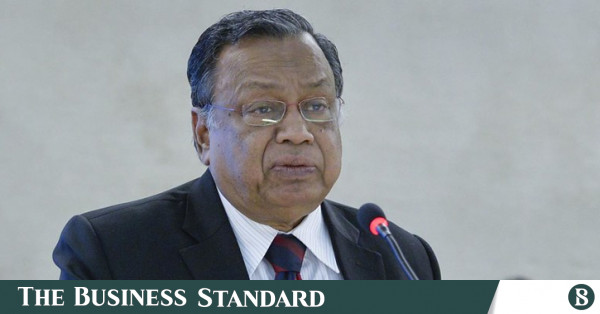Ali said those who thought Bangladesh would turn into Sri Lanka have been proved wrong
Finance Minister Abul Hassan Mahmood Ali. File Photo: Collected
“>
Finance Minister Abul Hassan Mahmood Ali. File Photo: Collected
The notion that the country’s economy could deteriorate has dissipated, Finance Minister Abul Hassan Mahmood Ali said yesterday, adding that now there is an increased interest from development partners in cooperating with Bangladesh across various sectors.
“Our remittance is increasing and the dilemmas surrounding the economy have passed. The opposition was spreading propaganda that we would turn into Sri Lanka, which we haven’t. We are stable,” he said during a pre-budget discussion for the fiscal 2024-2025 held with the Economic Reporters Forum (ERF) at the Secretariat today (31 March).
Furthermore, the minister shared insights from yesterday’s visit by representatives of the Asian Infrastructure Investment Bank, who affirmed the stability of Bangladesh’s economy and offered financial assistance as needed.
When asked whether there are plans to establish the Bank Commission and Revenue Commission in the upcoming budget, the minister said, “Since discussions are ongoing and nothing can be said definitively at this moment.”
At the meeting, Finance Secretary Md Khairuzzaman Mozumder said, “Bangladesh’s economy has made significant progress over the past 16 years, achieving an average growth of over 6.5%. Although there has been no high growth in recent years, it has not fallen below 6% due to the circumstances arising out of war and Covid.
“Our main challenge is controlling inflation and for this reason, the monitoring system has been strengthened along with the implementation of contractionary monetary policy. Amid this situation, we have commenced the budget preparation for the next fiscal year.”
He emphasised the government’s commitment to presenting a comprehensive economic roadmap for the next five years through the budget announcement.
Addressing recent improvements, the finance secretary highlighted increased remittance and export earnings, alongside favourable exchange rate trends saying “Earlier, the price of dollar was Tk120-Tk125, now it has come down to Tk110.”
He also pointed to Moody’s assessment that Bangladesh’s credit rating is better than ever, indicating overall macroeconomic stability.
During the meeting, the ERF proposed various measures to be included in the upcoming budget, including strategies to reduce inflation, expand the tax-free threshold, and establish regulatory commissions to ensure financial sector integrity.
The ERF further proposed enhanced revenue collection through curbing tax evasion, creating employment opportunities through increased investment, and improving education and healthcare standards.
Additionally, recommendations were made to address existing tax disparities between government and private employees, expand social safety net coverage, and provide subsidies to boost agricultural productivity.
ERF President Mohammad Refayet Ullah Mirdha, General Secretary Abul Kashem, along with executive committee members and senior organisation representatives, participated in the meeting.
